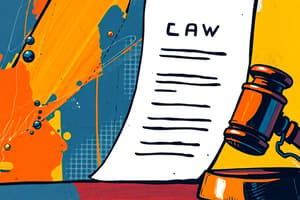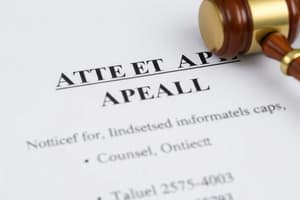Podcast
Questions and Answers
How many days does the defendant have to deliver a notice of intention to defend after being served with a summons?
How many days does the defendant have to deliver a notice of intention to defend after being served with a summons?
- 7 days
- 5 days
- 10 days (correct)
- 14 days
What must the defendant do to defend the action?
What must the defendant do to defend the action?
- Apply to the court for permission to defend the action
- Deliver a consent in writing to the exchange or service of subsequent documents and notices by way of facsimile or electronic mail
- Deliver a notice of intention to defend to the plaintiff only
- Deliver a notice of intention to defend to the registrar or clerk of the court and serve it upon the plaintiff (correct)
What is the period of time that is excluded from the 10-day period to deliver a notice of intention to defend?
What is the period of time that is excluded from the 10-day period to deliver a notice of intention to defend?
- 1 January to 31 January
- 16 December to 15 January (correct)
- 1 December to 15 January
- 1 November to 31 December
After the defendant has delivered a notice of intention to defend, what may any party do for the purposes of pleading?
After the defendant has delivered a notice of intention to defend, what may any party do for the purposes of pleading?
What happens if the defendant refuses or fails to deliver a consent in writing to the exchange or service of subsequent documents and notices?
What happens if the defendant refuses or fails to deliver a consent in writing to the exchange or service of subsequent documents and notices?
What is a default judgment?
What is a default judgment?
What documents must be lodged with the registrar or clerk of the court when requesting default judgment?
What documents must be lodged with the registrar or clerk of the court when requesting default judgment?
When can judgment by default be granted against a defendant?
When can judgment by default be granted against a defendant?
If the claim is unliquidated, how must the plaintiff prove the extent and nature of the damages?
If the claim is unliquidated, how must the plaintiff prove the extent and nature of the damages?
In the case of an action based on a liquid document, what additional document must be attached to the request for judgment?
In the case of an action based on a liquid document, what additional document must be attached to the request for judgment?
When must the registrar or clerk of the court refer the request for default judgment to the court?
When must the registrar or clerk of the court refer the request for default judgment to the court?
What is an example of an unliquidated claim given in the text?
What is an example of an unliquidated claim given in the text?



